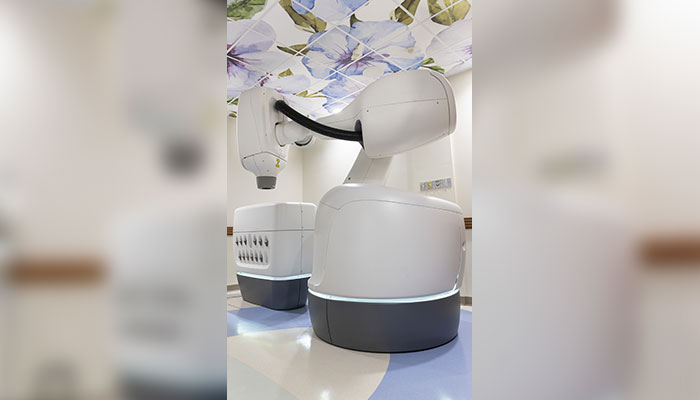BIDMC Leading CyberKnife Center Delivers Outstanding Care for Patients with Prostate Cancer
SEPTEMBER 27, 2024

About one in eight men will be diagnosed with prostate cancer during their lifetime, according to the American Cancer Society. It is the second most common cancer diagnosis among men in the US after skin cancer. When confronted with this diagnosis, patients have a variety of treatment options to consider, each affecting their daily routine, recovery, and overall quality of life.
Beth Israel Deaconess Medical Center (BIDMC) is equipped with one of the region’s leading CyberKnife centers that specializes in prostate cancer treatment, treating 300-400 patients each year. CyberKnife is a sophisticated system that delivers highly precise, focused radiation to tumors using real-time, image-guided robotics. This technique is known as stereotactic body radiation therapy (SBRT) and it’s an effective treatment method for many localized tumors.
Typically, the treatment pathways for prostate cancer have only consisted of either surgery or conventional radiation therapy. Radiation delivered with CyberKnife provides an equally effective and extremely safe non-invasive alternative for many patients with localized prostate cancer.
Under the leadership of Mary Ann Stevenson, MD, PhD, and Irving Kaplan, MD, BIDMC has spearheaded research on CyberKnife and SBRT as it concerns prostate cancer for years — one study, Meier et al (2018) demonstrated that even when expanding this therapy to patients across multiple healthcare institutions, the five-year overall survival rate of this treatment was an astounding 95.6%. Meanwhile, toxicities from the treatment were minimal.
Given the highly targeted design of SBRT delivered through CyberKnife, radiation-related injury in adjacent tissues is reduced, and side effects are often minimal as a result. Side effects can include urinary and bowel urgency and frequency, and erectile dysfunction.
Due to the highly targeted and precise method by which CyberKnife delivers SBRT, the treatment program is usually shorter than that of standard radiation therapy. A typical CyberKnife treatment regimen for a patient with prostate cancer consists of 5 sessions spread across 7 days. In contrast, a traditional radiation therapy regimen for the same cancer diagnosis often consists of 28–44 daily sessions over 6–9 weeks.
Additionally, a hallmark study from Tree et al (2022) demonstrated that the rate of grade 2 and lower toxicities was lower in patients undergoing SBRT via CyberKnife compared to SBRT administered via a conventional linear accelerator.
CyberKnife is an outpatient procedure that requires no hospitalization. Coupled with its minimal side effects, recovery time following CyberKnife is often less compared to that of a surgical procedure. CyberKnife can be especially beneficial to elderly patients who may struggle to recover post-surgery.
Dr. Nima Aghdam, a radiation oncologist at BIDMC, specializes in delivering SBRT to prostate cancer patients using CyberKnife. From his perspective, CyberKnife is a great treatment modality but it’s not the only factor leading to positive patient outcomes.
“CyberKnife is a tool but it’s the BIDMC experience that ultimately makes the difference,” Aghdam attests. “[it’s] an experience that’s enriched by our administrative staff, nurses, physicists, dosimetrist and radiation therapists.”
At BIDMC, a multidisciplinary approach is used to diagnose and treat patients with prostate cancer. Following a prostate cancer diagnosis, patients meet with their entire care team which typically includes a medical oncologist, surgeon, and radiation oncologist. The patient has the option to weigh the pros and cons of all their different options, including active surveillance.
According to Dr. Aghdam, many patients’ quality of life can benefit from active surveillance and close monitoring of their tumor, as opposed to opting for treatment right away. Regardless, the patient’s individual circumstances are always considered before the team makes a recommendation on treatment protocol.
“We have an individual plan for each patient, it's in effect tailor-made. We’re sort of a boutique for prostate cancer care — we try to fit the guideline to the patient, not the patient to the guideline” noted Dr. Aghdam.
Following treatment with CyberKnife, Dr. Aghdam looks forward to the many follow-up visits over the years.
“What I love most is seeing patients years later, talking about their vacations rather than their treatments. I keep follow-up appointments on my schedule because I enjoy witnessing how my patient’s lives are transformed after treatment. And if rare side effects arise, I get to see them thrive after we intervene.”
Ultimately, SBRT delivered through CyberKnife may not be the right option for everyone, but it can be highly beneficial for many patients with localized prostate cancer.
Dr. Aghdam provides consulting services for Accuray Incorporated.
